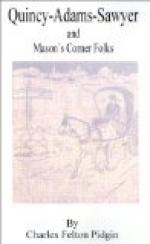This provoked more shouts and hand-clapping, and ’Zekiel blushed like a peony.
Lindy Putnam handed her slip to Quincy; he took in its meaning at a glance and looked at her inquiringly.
Strout saw the glance and cried out, “Oh, come, now; don’t leave out nothin’; read it jist as it’s writ.”
Lindy nodded to Quincy and he read:
“There is no heart but
hath some wish unfilled,
There is no soul without
some longing killed,
With heart and soul
work for thy heart’s desire.
And turn not back for
storm, nor flood, nor fire.”
“This is gittin’ quite tragic,” said Strout. “I guess we’ve had all we want to eat and drink, and have listened to all the bad poetry we want ter, and I move—”
“Second the motion,” cried Abner Stiles.
“And I move,” continued Strout, “that we git back inter the kitchen, and have a little dance jist to shake our suppers down.”
After the company returned to the kitchen, Abner was again lifted to his elevated position on the kitchen table, and the fun began again. There was no doubt that in telling stories Abner Stiles often drew the long bow, but it was equally true that he had no superior in Eastborough and vicinity on the violin, or the fiddle, as he preferred to call it. He was now in his glory. His fiddle was tucked under his chin, a red silk handkerchief with large yellow polka dots protecting the violin from injury from his stubbly beard rather than his chin from being injured by the instrument.
After a few preliminary chords, Abner struck up the peculiar dance movement very popular in those days, called “The Cure.” As if prearranged, Hiram Maxwell and Mandy Skinner ran to the centre of the room and began singing the words belonging to the dance. Abner gradually increased the speed of the melody, and the singers conformed, thereto. Faster and faster the music went, and higher and higher the dancers jumped until the ceiling prevented any further progress upward. They leaned forward and backward, they leaned from side to side, but still kept up their monotonous leaps into the air. Finally, when almost exhausted, they sank into chairs hastily brought for them, amid the applause of the party.
Quincy had seen the dance at the city theatres, but acknowledged to himself that the country version was far ahead of the city one. At the same time it seemed to him that the dance savored of barbarism, and he recalled pictures and stories of Indian dances where the participants fell to the ground too weak to rise.
“I put my right hand in,” called out one of the fellows. Cries of “Oh, yes, that’s it!” came from the company, and they arranged themselves in two rows, facing each other and running the length of the long room. They were in couples, as they came to the party. Abner played the melody on his violin, and the fellows and girls sang these words:
“I put my right hand
in,
I put my right hand
out,
I give my right hand
a shake, shake, shake,
And I turn myself about.”




